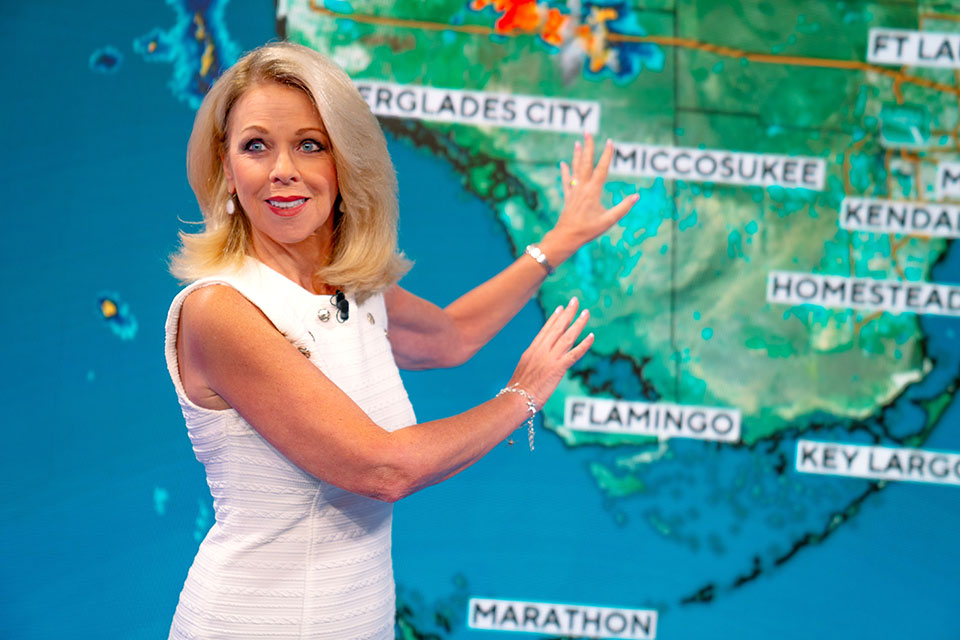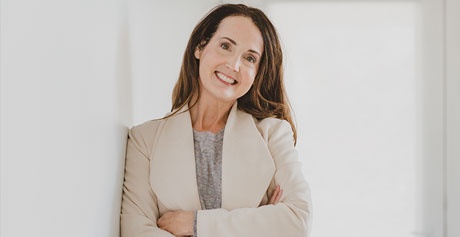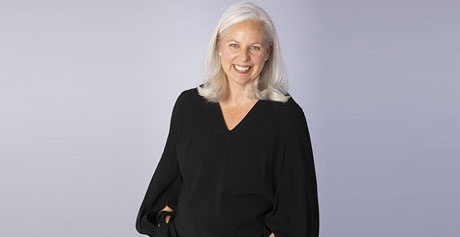She was the First Female Meteorologist to Cover a Landfalling Hurricane for The Weather Channel and has Won Five Regional Emmy Awards. A Special Interview with Miami Meteorologist, Cindy Preszler

Q: How did you become interested in the weather?
CP: I’ve been asked this question many times over the years, and I have to give credit to my dad and grandma. They passed the love for weather along to me from a very young age. I’m originally from South Dakota, grew up on a farm where weather is the life-bread & it’s the number one thing farmers talk about. So, I listened.
My dad and grandma discussed every aspect in detail because he always knew what would happen later that day without listening to the forecast on the radio or watching it on TV. He knew by paying attention to the clouds and the “feel” of the atmosphere. He was my first meteorology teacher, and I was hooked!
When I was a kid, we would sit on the front steps in the evening and watch storms come in from the west. Eastern South Dakota is very flat so we could see for miles. He explained to me how a green color in the clouds could mean hail or which wind direction would give us storms or just a gentle rain. He always knew if we would get severe storms that night and you know what, he was right!
So that is where my love for weather came from. I’m so grateful to my dad for his never-ending support with my meteorology career.
Q: When did you decide to be a Meteorologist?
CP: Even though I was very interested in weather at a young age, it never dawned on me that I could actually work with weather as a career. You see back in the 70s and early 80s, there weren’t many female meteorologists working on television. I faithfully watched the local CBS station’s weathercasts, but it was a man giving all that interesting information. He was so good, and viewers loved him, and so did I! I only saw women working as reporters or anchors, never weather. So that’s what I pursued in college, taking only an introductory meteorology class.
But fate stepped in. During my first job as a news reporter in Nebraska, the weekend weather person left, and I was given a shot at the position. I learned whatever I could from the chief, moved on to my next station in Savannah, Georgia, doing weekend weather and never looked back from that point on. I continued my meteorology education with Mississippi State University, worked for The Weather Channel, stations in Lexington, Chicago, St. Louis, Fort Myers, & now Miami … and by the way, female meteorologists are now everywhere!
Q: What are some of the most challenging aspects of being a Meteorologist?
CP: I would say the challenges have changed a great deal over the years. Ten or twenty years ago, I would say my biggest challenge was getting the forecast right. But now with social media & phone apps, the hardest part of my job is communication and trying to remain relevant in this ever-changing environment. Viewers can get weather information from so many different sources now. It has become confusing; they have no idea who or what to believe. So how do broadcast meteorologists remain necessary? Hopefully, viewers will continue to seek the most accurate and qualified weather information instead of what is easiest at their fingertips. The broadcasting business continues to evolve to meet these changing times, but it must come down to what is most important and that is to provide viewers with the most accurate & timely weather information they need and want. I hope we’ll always be able to do that.
Q: Can you give us a behind-the-scenes look at what goes into making a forecast?
CP: Putting a weather forecast together is a constant task that continually gets changed and updated throughout the day. That’s because the atmosphere never stands still, it is fluid. Changes are occurring all the time so the forecast needs to be tweaked even if it may seem like nothing has changed.
I work the afternoon/evening shift, so my forecasting really begins in the morning when I get up. It’s straight to the computer to see what has changed overnight. There are various models of the atmosphere, the satellite loops give tons of information. I check the current conditions and read the updates from the National Weather Service. I have to admit, since I worked at The Weather Channel a few years ago, I love to watch when I’m getting dressed for work. That way, I have a national briefing before I even walk in the door.
When I get to the station, I check the forecast from the morning met., look over the models again, and of course it is now hurricane season, so the Tropical Update is always top of mind.
Then at this point, it’s time to work on the graphics. Each day we try to come up with something different and interesting that the other stations may not have. All of this takes time and it’s a constant process.
Q: Can you share with our audience one of your most memorable weather events you’ve covered?
CP: When I was working for The Weather Channel in the late 80s, I had the opportunity to cover the landfall of Hurricane Hugo in Charleston, South Carolina. It was really the first time an intense land-falling hurricane had been covered remotely on-air continuously. Meteorologist Dennis Smith and I along with a fantastic crew, broadcast the impacts as they were happening hour by hour. We set up a few miles inland knowing how dangerous this hurricane was going to be on the coast. I still have photos and video from those broadcasts. We were wearing yellow rain slickers, I thought I looked like a rubber duck on-air! It was frightening and exciting at the same time as Hugo made landfall during the night. As the eye wall moved overhead, clouds swirled, and the winds screamed. We were very glad to be away from the coast. The next morning, we packed up the satellite truck and all our equipment and drove to Charleston. It was devastating! So much shattered glass in the streets, buildings destroyed, and trees sheared off like toothpicks. I’ll never forget it. Nature is so powerful!
Q: Is there one season of the year that's easier or harder to forecast?
CP: It depends where you are located. When I was working up north in Chicago or St. Louis, the winter season was the most difficult. Forecasting accurate snow totals is very difficult. Viewers want to know exactly how much snow will fall on their driveway and they want it down to a tenth of an inch. The problem is, depending upon how dry the air is, accuracy in such small amounts can vary in short distances. I guess it’s a perception issue and communicating to viewers is the toughest part. Forecast models are good, but not flawless. Maybe someday, they will be much better in smaller grids.
But now I’m working in South Florida, so hurricane season gets top billing. Climate Change has made huge changes to our environment and with a warming planet, we continue to see things that have not happened in our known past. Explaining uncertainty to viewers is a difficult thing to do.
Q: How many times are you out in public and have people come up and complain about or ask you questions about the weather?
CP: I’ve been very fortunate so far in my career that no one has been difficult or threatening to me. I have received strange emails and phone calls about a busted forecast, but people have never confronted me in person.
But I do get tons of weather questions and I love it! Weather is the one topic that ties us all together. No matter what you do for a living or how old you are, weather is interesting and important to your everyday life. I’m happy to accommodate.
Q: Do you have any advice you can share for those women who may want to pursue a career as a Meteorologist?
CP: I just had a conversation with a colleague about this very thing. She is interested in pursuing a career in weather and this is what I told her.
You really have to love what you are doing. Meteorology is a tough but very rewarding career, add broadcasting to that and now it’s not only difficult but ever-changing too. It will take every ounce of energy you have. It is a commitment to help people in life and death situations and you better know what you are talking about.
Don’t go into it if you just want to be on TV. There are many other avenues available to do that.
Get a mentor. That person should be someone you look up to for good advice. Someone who is willing and excited to help show you the path to success. Maybe that person is doing the job you want to attain in the future or maybe that person is just smart when it comes to life’s decisions. In any case, he or she can make a big difference.
Be grateful and work hard. Don’t take the little things for granted. And most of all, treat others the way you want them to treat you. We are all in this together. It’s not an easy career but you won’t regret if you do the right thing.
Seven Things About Cindy Preszler
1. If you could share a meal with any 4 individuals, living or dead, who would they be?
My dad. He passed away in 2019 & I miss his wisdom.
My great, great grandmother. I have so many questions!
Abraham Lincoln
Jesus
2. What celebrity would you like to meet at Starbucks for a cup of coffee?
Carol Burnett… love her humor & creativity.
3. Among your friends, what are you best known for?
We joke about being “The Golden Girls” & of course, I’m Rose, Betty White, because I’m from the Midwest. TV played a very big part of my childhood. I watched comedies like Happy Days, Laverne & Shirley, The Brady Bunch, & the Carol Burnett Show.
4. What’s your favorite quote or saying?
My dad always said, “People want a lot when the day is long.” Yup, he’s right!
5. What’s your big passion?
Helping animals, in particular, cats.
6. What would you sing at Karaoke night?
Paradise by the Dashboard Light
7. What is your favorite game or sport to watch and play?
St. Louis Cardinals Baseball


